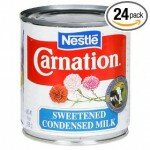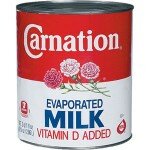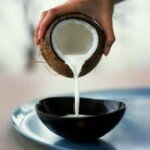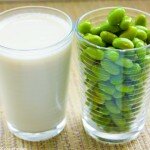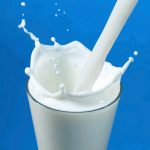Nutrition Information: Milk (Condensed, Evaporated, Coconut, Soy, Whole)
Posted on | March 16, 2012 | No Comments
Here is guide to the best types of milk you can choose when given the choice. Enjoy!
What is Condensed Milk:
Condensed milk is a highly shelf-stable milk product made by evaporating much of the water from milk to create a thick, syrupy liquid, and adding sugar to it before canning in a sterilized can. Condensed milk has a shelf life of up to two years.
- Condensed Milk: 100ml
- Energy: 415 calories
- Protein: 10.2 g
- Carbs: 70.3 g
- Fat: 11.2 g
What is Evaporated Milk:
Evaporated milk is made by exposing fresh milk to high heat and evaporating about 60% water. The end result is a dense, high calorie milk that is usually fortified with vitamins A & D, just like fresh milk. You can water down the milk if you intend to serve it as regular milk, by adding equal amounts of water to the evaporated milk. This will lower calorie content and vitamin distribution. Low fat versions are also available.
- Evaporated Milk: 100ml
- Energy: 143 calories
- Protein:7.2 g
- Carbs: 10.7 g
- Fat: 8 g
What is Coconut Milk:
Coconut milk is derived from the flesh of the coconut which has been finely grated and steeped in hot water. Next, the soaked pieces are squeezed through cheesecloth, and the liquid collected is coconut milk. This process may be repeated once or twice to produce lighter coconut milk and different consistencies. The first pressing is allowed to sit for a while, coconut cream rises to the top. While coconut milk is high in saturated fat, it is much healthier than other saturated fat products, and the fat is easily metabolized by the body. Coconut milk also offers some particular health benefits. It is anti-carcinogenic, anti-microbial, anti-bacterial, and anti-viral. The main saturated fat that it contains, lauric acid is also found in mother’s milk and has been shown to promote brain development and bone health.
- Coconut Milk: 100ml
- Energy: 194 calories
- Protein: 0 g
- Carbs: 3 g
- Fat: 20 g
What is Soy Milk?
Soy milk is made by soaking soybeans, grinding them with water. The fluid which results after straining is called soy milk. Plain soy milk is very nutritious: it’s an excellent source of high quality proteins, isoflavones and B-vitamins. Soy milk is free of the milk sugar (lactose) and is a good choice for people who are lactose intolerant. Also, it is a good alternative to those who are allergic the proteins of cow’s milk. It contains no cholesterol and is very low fat
- Soy Milk: 100ml
- Energy: 54 calories
- Protein: 4.6 g
- Carbs: 5.1 g
- Fat: 2 g
What is Milk?
Milk is defined as the lacteal secretion obtained by milking mammalian animals. The most commonly purchased milk is from cows. It comes Pasteurized (heated to 145 degrees for 30 minutes then rapidly cooled to extend shelf life); Unpasteurized (heated to 212 degrees for 2 seconds to destroy bacteria, has longer shelf life than pasteurized); Homogenized (heated and pressurized to disperse fat throughout milk)
- Milk (whole): 100ml
- Energy: 62 calories
- Protein: 3.3 g
- Carbs: 4.7 g
- Fat: 3.6 g
Related posts:
Calories in Marigold Non-Fat Yoghurt ...
Ais Kachang (or Ice Kachang) is a common Malay...
Originating from Sydney, Australia, however no...
The true fact is the only fluid that we need to ...
Tags: best types of milk to drink > calories in coconut milk > calories in condensed milk > calories in evaporated milk > calories in milk > calories in serve of dairy > calories in soy milk > calories in soya milk > condensed milk > is condensed milk healthy > nutrition in milk
Comments
Leave a Reply
You must be logged in to post a comment.
